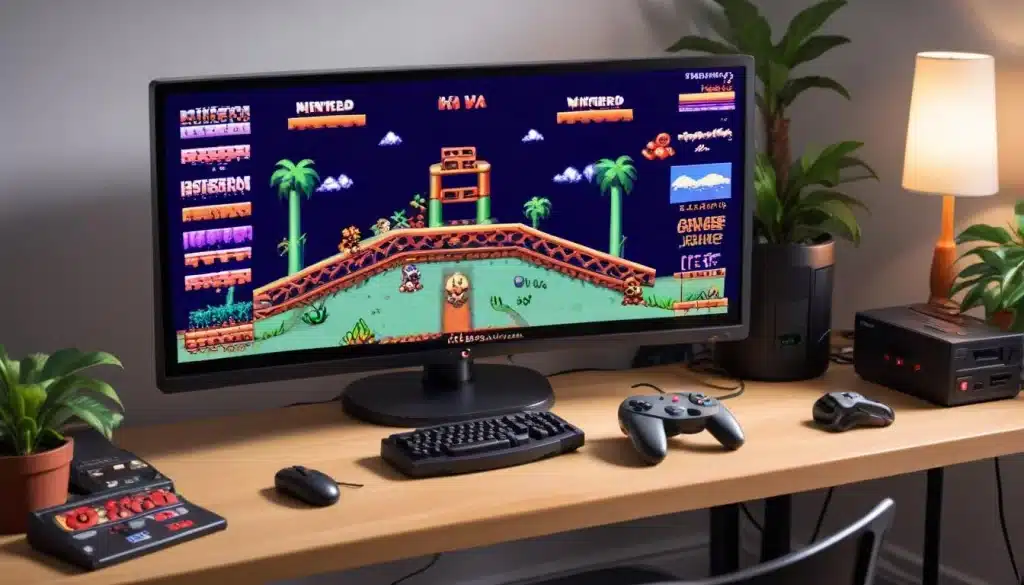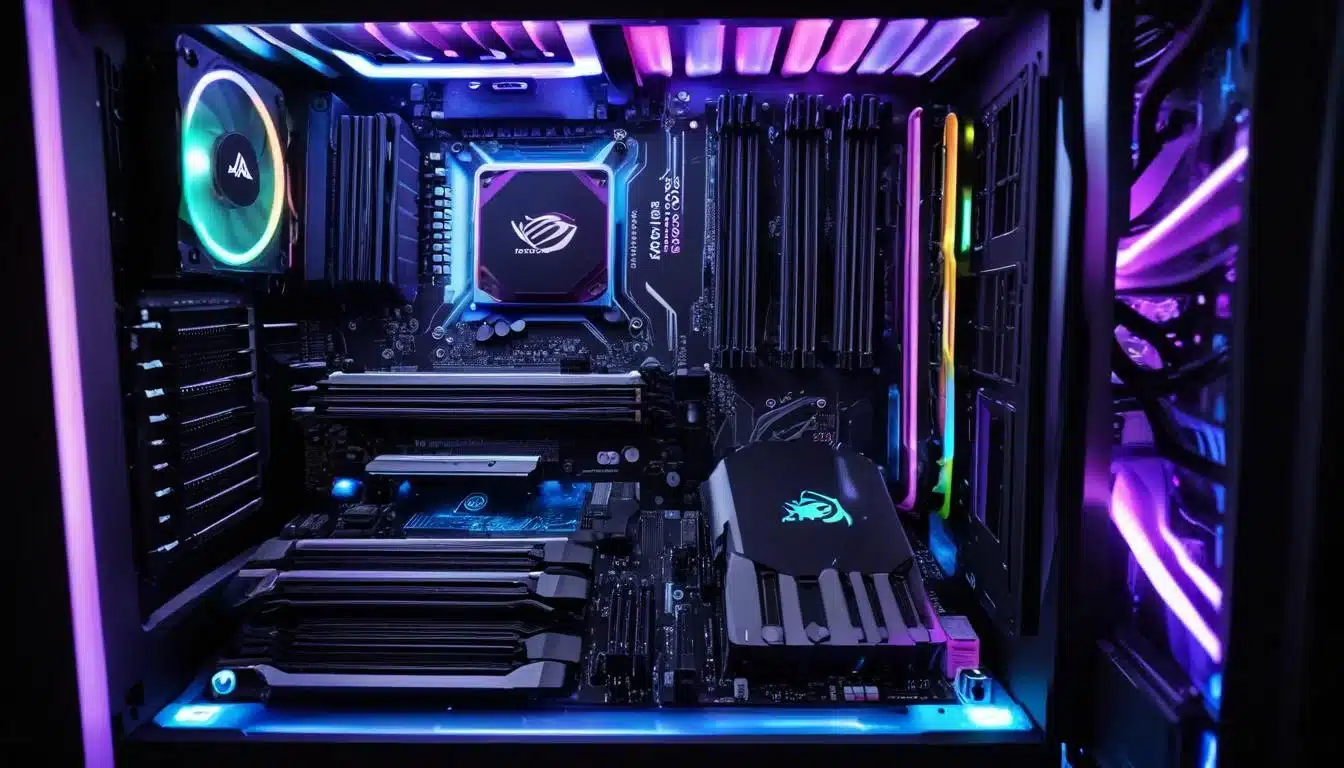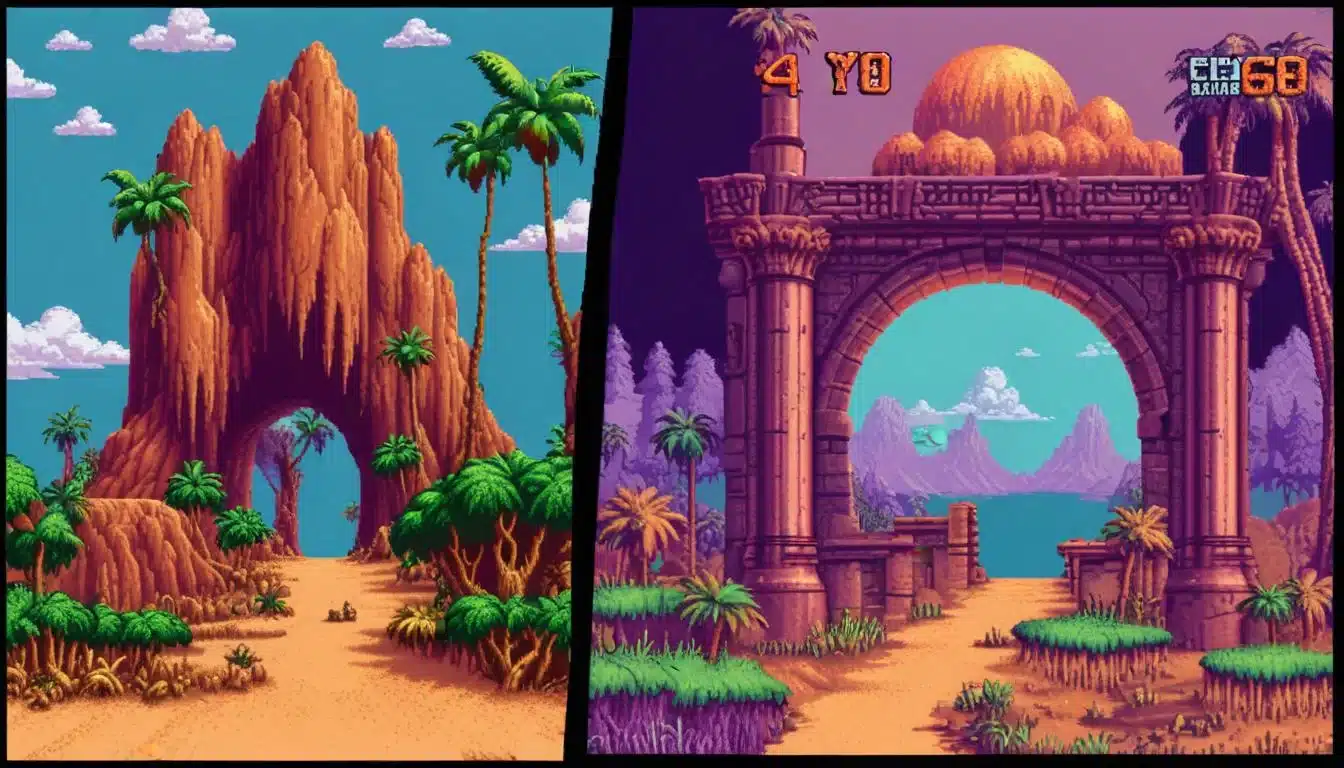PC Game Emulation: Play Classic Console Games on Your PC in 2025

PC game emulation in 2025 empowers players to enjoy classic console titles on their computers, offering enhanced visuals, customizable controls, and a vast library of retro experiences.
Have you ever yearned to revisit the golden era of gaming, experiencing beloved titles from consoles long past, but with the convenience and power of your modern machine? In 2025, PC game emulation has evolved into a sophisticated art form, offering a seamless bridge between yesterday’s iconic games and today’s cutting-edge hardware. This guide will delve into everything you need to know to transform your PC into a versatile retro gaming powerhouse, ensuring you can play classic console games with unprecedented fidelity and customization.
The evolving landscape of PC game emulation
PC game emulation has come a long way from its humble beginnings. What once required niche knowledge and significant technical prowess is now more accessible than ever, thanks to dedicated communities and continuous development. In 2025, emulators are not just about running old games; they’re about enhancing them, often surpassing the original console experience with improved resolutions, frame rates, and even custom modifications.
The journey of emulation has been marked by significant milestones, from early attempts to mimic 8-bit systems to the sophisticated tools capable of running complex 3D environments from sixth and seventh-generation consoles. This evolution has been fueled by advancements in CPU and GPU technology, allowing software to accurately replicate the intricate hardware of various gaming platforms. Modern emulators leverage multi-core processors and powerful graphics cards to deliver experiences that were once thought impossible outside of their native hardware.
Key advancements in 2025
Several technological leaps have defined the current state of PC game emulation:
- Accuracy improvements: Emulators are now more cycle-accurate, meaning they replicate console hardware behavior with greater precision, reducing glitches and ensuring authentic gameplay.
- Performance optimization: Developers have refined emulation code to be more efficient, allowing a wider range of PCs to run demanding emulated titles smoothly.
- User-friendly interfaces: Many emulators now feature intuitive graphical user interfaces (GUIs), making setup and configuration straightforward for even novice users.
- Enhanced rendering features: Beyond simple upscaling, emulators offer advanced rendering options like anisotropic filtering, anti-aliasing, and custom shaders to drastically improve visual quality.
These enhancements collectively contribute to a robust and enjoyable emulation experience, making 2025 an excellent year to dive into the world of classic console gaming on your PC.
Choosing the right emulator for your needs
The world of emulation is vast, with specialized software for nearly every console ever made. Selecting the correct emulator is crucial for a smooth and enjoyable experience. The ‘best’ emulator often depends on the specific console you wish to emulate and your PC’s specifications. While some emulators are all-in-one solutions, others are highly specialized for a single system, offering unparalleled accuracy and features for that particular platform.
When considering an emulator, it’s important to look at its active development status, community support, and compatibility list. A well-maintained emulator will receive regular updates, fixing bugs, improving performance, and adding new features. Strong community support means access to forums, guides, and troubleshooting tips, which can be invaluable when encountering issues.
Popular emulator choices for various consoles
- Nintendo Systems (NES, SNES, N64, GameCube, Wii, Switch): For older Nintendo consoles, emulators like Mesen (NES), Snes9x (SNES), and Project64 (N64) are highly regarded. For GameCube and Wii, Dolphin Emulator stands out as a powerful and feature-rich option. Yuzu and Ryujinx are the leading choices for Nintendo Switch emulation, constantly evolving to support newer titles.
- Sony Systems (PlayStation, PS2, PSP, PS3): PCSX2 is the gold standard for PlayStation 2 emulation, offering extensive compatibility and customization. PPSSPP excels at PSP emulation, providing excellent performance even on lower-end hardware. RPCS3 is the forefront of PlayStation 3 emulation, a monumental achievement given the complexity of the PS3’s architecture.
- Microsoft Systems (Xbox, Xbox 360): Xemu is making significant strides in original Xbox emulation, while Xenia is the most prominent emulator for Xbox 360, though it’s still very much a work in progress for many titles.
Researching specific emulator communities and compatibility lists before committing is always a good idea. This ensures that the games you want to play are well-supported and that your PC meets the recommended system requirements for optimal performance.
Setting up your PC for optimal emulation
To truly unlock the potential of PC game emulation, proper setup and configuration are key. This goes beyond simply installing the emulator; it involves optimizing your system, configuring controls, and understanding basic emulator settings. A well-configured setup can mean the difference between a frustrating, laggy experience and a smooth, visually stunning journey into gaming history.
Begin by ensuring your PC’s operating system and graphics drivers are up to date. Outdated drivers can lead to performance bottlenecks and compatibility issues. Modern emulators often leverage advanced graphics APIs like Vulkan or DirectX 12, so a current GPU and drivers are essential. Additionally, consider the storage aspect; classic game ROMs and ISOs can take up significant space, especially for newer consoles, so ample storage is beneficial.

Essential configuration steps
- Controller setup: While keyboard controls are often an option, a dedicated gamepad (USB or Bluetooth) is highly recommended for an authentic console experience. Emulators typically offer robust controller mapping features, allowing you to assign buttons to match the original console layout or customize them to your preference.
- Graphics settings: This is where modern PCs truly shine. You can often increase internal resolution far beyond the original console’s capabilities, apply anti-aliasing, and use texture packs to significantly enhance visuals. Experiment with these settings to find a balance between visual fidelity and performance on your specific hardware.
- Audio configuration: Ensure your audio output is correctly configured within the emulator to avoid crackling or latency issues. Some emulators offer audio enhancements or specific drivers to improve sound quality.
- BIOS files: Many emulators, especially for PlayStation, PlayStation 2, and older Nintendo systems, require BIOS files to function. These are proprietary firmware files from the original consoles. Obtaining these legally often involves extracting them from your own console, though their availability online is a separate, legally ambiguous topic.
Taking the time to fine-tune these settings will dramatically improve your emulation experience, making your PC feel like the ultimate retro gaming machine.
Understanding ROMs, ISOs, and legal considerations
The heart of PC game emulation lies in game files, commonly known as ROMs (for cartridge-based systems) and ISOs (for disc-based systems). These are digital copies of the original game data. While emulators themselves are legal software tools, the legality surrounding the acquisition and use of ROMs and ISOs is a complex and often debated topic. It’s crucial to approach this aspect with an understanding of intellectual property rights.
In most jurisdictions, owning a physical copy of a game grants you the right to create a personal backup copy for your own use. This means if you own a PlayStation 2 game disc, you could legally create an ISO of that disc for use with a PS2 emulator on your PC. However, downloading ROMs or ISOs from the internet, even for games you own, generally falls into a legal gray area, as it often involves unauthorized distribution. Distributing copyrighted game files is almost universally illegal.
Navigating the legal landscape
- Personal backups: The safest and most legally sound way to obtain game files is to create backups from your own original game cartridges or discs. Tools and tutorials exist for this purpose, although they can be technical.
- Public domain and homebrew: Some games have entered the public domain, or are freely distributed homebrew titles, making them entirely legal to download and play.
- Ethical considerations: Many in the emulation community adhere to the principle of only playing ROMs for games they legally own. This respects the intellectual property of game developers and publishers.
It’s important to be aware of the laws in your region regarding copyrighted material and to make informed decisions about how you acquire your game files. The longevity and public perception of emulation often depend on responsible practices within the community.
Beyond the basics: enhancing your retro gaming experience
Once you’ve mastered the fundamentals of PC game emulation, a world of advanced customization and enhancement opens up. Modern emulators offer a plethora of features that can elevate your retro gaming beyond what was ever possible on original hardware. These enhancements range from visual upgrades to quality-of-life improvements, making old games feel fresh and new.
Consider features like save states, which allow you to save your game at any point, regardless of in-game save points. This is particularly useful for difficult retro titles. Fast-forwarding is another common feature, letting you speed through tedious sections or cutscenes. These small additions significantly improve the playability of many classic games, adapting them to a modern player’s expectations.

Advanced emulation features to explore
- High-resolution texture packs: For many popular emulated games, communities have created high-resolution texture packs. These replace the original low-resolution textures with much sharper, more detailed versions, completely transforming the game’s visuals.
- Widescreen hacks: While many older games were designed for 4:3 aspect ratios, some emulators offer widescreen hacks that attempt to render the game in 16:9 without distorting the image, providing a more modern viewing experience.
- Custom shaders: Shaders can be applied to add various visual effects, such as CRT scanlines to mimic the look of an old television, or advanced post-processing effects to give games a more contemporary feel.
- Modding support: Some emulator communities develop extensive modding tools, allowing players to create and install fan-made content, from new character skins to entirely new levels and game mechanics.
Experimenting with these advanced features can breathe new life into your favorite classic titles, offering a personalized and often superior gaming experience compared to the original.
The future of PC game emulation in 2025 and beyond
The trajectory of PC game emulation in 2025 points towards continued innovation and accessibility. As hardware becomes more powerful and developers refine their techniques, we can expect even more accurate and feature-rich emulators for increasingly complex systems. The dream of perfectly emulating every console, regardless of its architecture, draws closer with each passing year.
One significant area of future development lies in cloud-based emulation. While currently nascent, the ability to stream emulated games from powerful remote servers could bypass the need for high-end local hardware, making retro gaming accessible to an even broader audience. This would also simplify the setup process, as the heavy lifting of emulation would occur off-site.
Emerging trends and challenges
- AI and machine learning: Artificial intelligence could play a role in optimizing emulation, perhaps by predicting game states or generating missing assets, further enhancing accuracy and performance.
- Legal evolution: As emulation grows in popularity, the legal frameworks surrounding it may evolve. Advocacy for game preservation could lead to clearer guidelines for digital archiving and personal use.
- Preservation efforts: Emulation is increasingly recognized as a vital tool for video game preservation, ensuring that classic titles remain playable and accessible for future generations, even as original hardware fails.
- VR integration: Imagine playing classic games in a virtual reality environment, perhaps standing in a virtual arcade. While challenging, some experimental emulators are already exploring VR integration.
The future of PC game emulation is bright, promising even more immersive, accessible, and enhanced ways to experience the rich history of video games.
Troubleshooting common emulation issues
While PC game emulation has become highly refined, it’s not without its occasional hiccups. Encountering issues like graphical glitches, audio problems, performance drops, or controller recognition failures is a normal part of the process. Fortunately, the vast and active emulation community has developed numerous solutions and troubleshooting guides for most common problems. Patience and methodical problem-solving are your best allies.
Before diving deep into complex solutions, always start with the basics. Double-check your emulator settings against recommended configurations for specific games. Ensure your graphics drivers are up to date and that your PC meets the minimum system requirements for the emulator and the game you’re trying to run. Often, a simple restart of the emulator or your PC can resolve transient issues.
Common problems and quick fixes
- Graphical artifacts: Try switching between different video backends (e.g., Vulkan, OpenGL, DirectX) within your emulator’s graphics settings. Adjust resolution scaling and disable any experimental shaders.
- Slow performance/lag: Reduce internal resolution, turn off demanding graphical enhancements like anti-aliasing, and ensure your PC’s power settings are set to ‘High Performance.’ Close unnecessary background applications.
- Audio crackling/stuttering: Adjust audio buffer sizes in the emulator’s settings. Ensure your audio drivers are current. Sometimes, switching audio output devices can help.
- Controller not recognized: Check if your controller is properly connected and recognized by your operating system. Re-map controls within the emulator, and ensure any necessary controller drivers are installed.
- Game crashing/freezing: This can often be due to incorrect game region settings (NTSC vs. PAL), corrupted ROMs, or specific game compatibility issues. Check emulator forums for known issues with the particular game.
Leveraging community forums, wikis, and Discord servers dedicated to specific emulators is an excellent way to find solutions to more obscure problems. Chances are, someone else has encountered and solved the issue you’re facing.
| Key Aspect | Brief Description |
|---|---|
| Emulator Selection | Choose emulators based on console, features, and community support for optimal performance. |
| Setup & Optimization | Update drivers, configure controls, and adjust graphics settings for enhanced visuals and smooth gameplay. |
| Legal Considerations | Understand intellectual property rights regarding ROMs/ISOs; personal backups are generally safest. |
| Enhancement Options | Utilize high-res texture packs, widescreen hacks, and shaders for a personalized retro experience. |
Frequently asked questions about PC game emulation
The act of emulating is generally legal, as emulators are software tools. However, the legality of obtaining and using copyrighted game ROMs or ISOs can be ambiguous. Creating backups of games you legally own for personal use is often considered permissible, but downloading copyrighted content from unauthorized sources is usually illegal.
For older consoles (up to PS1/N64), most modern PCs will suffice. For more demanding systems like PS2, GameCube, Wii, and especially PS3/Switch, a powerful CPU (multi-core is beneficial) and a dedicated graphics card are highly recommended for smooth performance and enhanced visuals.
You don’t physically need the original discs or cartridges to run games on an emulator, but it is the most legally sound way to obtain the game files (ROMs/ISOs). You can create digital backups from your own physical media. Downloading these files from the internet without ownership is generally not advised due to copyright laws.
Absolutely! Many modern emulators allow you to increase internal rendering resolution, apply anti-aliasing, anisotropic filtering, and even use custom high-resolution texture packs created by the community. This can make classic games look significantly sharper and more detailed than they ever did on their original hardware.
While emulator compatibility is constantly improving, not every game for every console is perfectly playable. Some titles may have minor glitches, performance issues, or even be unplayable. It’s always a good idea to check an emulator’s compatibility list or community forums for specific game support before expecting a perfect experience.
Conclusion
PC game emulation in 2025 stands as a testament to technological progress and the enduring appeal of classic video games. It offers a powerful and flexible platform for players to rediscover cherished titles, often with enhancements that surpass the original console experience. From meticulously configuring your setup to exploring advanced graphical modifications, the journey into emulation is as rewarding as the games themselves. As emulators continue to evolve, bridging the gap between gaming’s past and present, the ability to play classic console games on your PC will only become more accessible, visually stunning, and deeply engaging for generations of gamers to come.